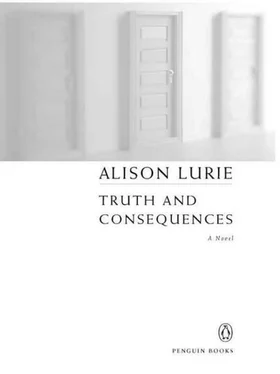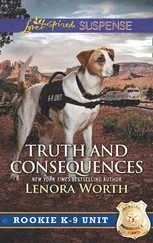“But how could it not?” Jane cried.
“Because it’s only play, she says. There’s no past or future to it. No depth.”
“No depth?”
“Just a little kissing and hugging. So it doesn’t count.” Henry smiled uncomfortably.
Jane sat back, staring at him. The unwelcome thought had come to her that perhaps Alan and Delia were no more guilty than she and Henry, and that possibly everything that had happened between them was also shallow and temporary. “I see,” she said. “I mean, I don’t see.”
“Neither do I, if you want to know,” he said. “Not anymore.”
“But at least she agrees that something happened,” Jane said.
“Alan doesn’t?”
Jane shook her head. “That’s the worst thing, the lies,” she said with a sob. “If he admitted what was going on, if he’d said he was sorry, I could stand it. If he said they were only doing what we’ve done, I’d have to, I guess—” She swallowed awkwardly. If Alan had told me the truth, I would have had to tell him the truth, she thought suddenly, and then maybe I wouldn’t be here.
“But he didn’t say that,” Henry prompted.
“No, he said that Delia was having a migraine, and he went to see if there was anything he could do for her. Then I broke into the room and screamed and threw things and made her headache much worse. He sort of turned it all upside down so everything was my fault. He said he never knew I could be so irrational and suspicious, and so violent.”
“Uh-huh,” Henry said. “It sounds like he’s been taking lessons from Delia.”
“How do you mean?”
“That’s what she does. If she doesn’t like the truth, she turns it around until she does, and eventually she’s convinced that things happened the way she says they did.”
“But you believe me, don’t you?”
“Yeah, sure. I believe you.”
“It’s not just the lies,” Jane said with a long sigh. “It’s as if Alan’s changed into a different person. Maybe partly because of the pain, but it’s more than that. It’s as if he’s under some awful spell. When he looks at me, it’s so cool and judging, as if I was just somebody he’d hired to work for him, who was making a nuisance of herself. Last night when we were talking in the kitchen I felt all cold and shivery, like the wind was blowing indoors. I can’t—I don’t—” With a wail, Jane collapsed against Henry.
“There, there,” he said, putting his arms around her, stroking her hair.
A few moments passed, then Jane sat up again. “The thing is, I don’t think I can stand to live in the same house with him anymore,” she said through tears.
“Really?”
“Uh-huh. Not now, at least.”
“That’s the best news I’ve heard in years,” Henry said. He pulled Jane toward him again and kissed her wet face. “Where will you live, then?” he said presently.
“I can stay on with my parents, in my old room.”
“That’s so wonderful.” He began to kiss her again.
“Janey, darling. Shouldn’t we—I mean, would you like to go somewhere where we can be together?” he said presently. “It’s so cold here, and anyone can see us.” He gestured across the parking lot at the stalls of the Farmers’ Market, where a vendor of honey and jam was glancing in their direction.
“I can’t,” Jane said with a sob. “I’m still sort of under the weather.” She registered the incomprehension on his face. “I’m bleeding,” she said awkwardly, and wished at once that she had chosen another phrase. But what she had said was true in every sense. She was underneath a storm of bad weather, blown about and half drowned, and bleeding emotionally as well as physically.
“I don’t care. I want to be with you.” Henry pushed Jane’s windbreaker aside and put one heavy warm hand on her cotton shirt, over her left breast. “Maybe we could go to the Center, to the cupola.”
“We can’t—” Jane felt weak and confused and excited, all at the same time. Even when he was well,Alan had never touched her during what he called “your monthlies,” though she had once or twice suggested it long ago. “Anyhow, we can’t go to the Center. There’s a conference there this weekend; the place is full of French literary theorists.”
“Yeah. Very bad vibes.” Henry laughed. “Then we’ll drive out into the country. I think I know a place.” He started the car and turned toward the exit.
I shouldn’t do this, Jane thought. I should tell him to stop and let me get out. But another part of her thought, Why not?
“There’s an old barn off the Myers Road, I saw it when I was jogging the other day,” Henry said presently. “No houses nearby, and nobody’s using it except to store hay.” Jane said nothing—she felt out of breath, unable to speak, as if she were standing in a strong wind.
“Here you are,” Henry said as he shoved open the sliding door of the barn. It was full of hay, but in tight rectangular bales. While Jane stood in the entrance shivering with cold or something more serious, he unfolded a knife and cut the wires on three bales of hay, then shook them out into a heap. “There you are.” Henry slid the barn door back into place; now the only light came from long vertical chinks in the sides and a triangular opening at the peak of the roof. Then he took off his duffle coat and spread it over the hay. “Here. Sit down, and I’ll warm you up.”
“Lovely, lovely,” Jane murmured nearly an hour later, not for the first time. She felt strange and light-headed and happy, as if she were floating on a sea of hay.
“Yeah. There’s nothing like the real thing.” Henry laughed. “I’d almost forgotten.”
“Me too.” It was true what he had hinted before, she thought: Delia only liked, only allowed, what her mother called “hanky-panky.” “Is it very late?”
“Well, it’s”—he held up a bare arm and checked his watch—“twelve-fifteen.”
“Oh, lord.” Jane gave a heavy sigh as a weight of obligation and guilt fell upon her, heavy and scratchy as the hay that towered around them. “I have to get back to the house.” She sat up.
“Really?” Henry yawned and pulled her toward him.
“Yes, I have to pack, and cook something for Alan that he can warm up over the weekend, and find a graduate student to drive him to campus and back next week.” She gave another, deeper sigh. What have I done? she thought. You’ve done what you’ve been wanting to do for months, a voice said in her head. Something wonderful and right, something selfish and wrong.
“You still think you have to take care of Alan?” Henry raised his eyebrows.
“Well, yes. For a while anyhow.” A sensation of fatigue came over Jane. “Until I can arrange for someone else to do it. Somebody has to.” She rose to her knees, pulling her clothes together and brushing herself off. The nest where they had lain was flattened and trampled, and slightly stained with bodily fluids.
“You’ll never be able to get this stuff back into bales,” she said.
“No, probably not.” Henry grinned. “And I’m not going to try.”
“But what will they think, the people who own the barn?”
“They’ll think it was tramps.”
“I suppose so.” It was tramps, Jane thought. I’m a tramp. But it was worth it.
Holding hands, stopping every few feet to kiss, they walked to his car.
“Can you call me this afternoon?” Henry asked as they reached the Farmers’ Market.
“Ye-es. I can call from the P&C. But won’t Delia be there?”
“Yeah, probably. And we’re supposed to go out to dinner tonight. Hell. Tomorrow—can you meet me here about ten?”
“I can’t do that.” Jane sighed. “My mom will expect me to go to church with her tomorrow morning, because it’s Sunday. And then there’s Sunday dinner. But maybe later.”
Читать дальше







![Кэмерон Доки - Правда и ее последствия[Truth and Consequences]](/books/79610/kemeron-doki-pravda-i-ee-posledstviya-truth-and-con-thumb.webp)




